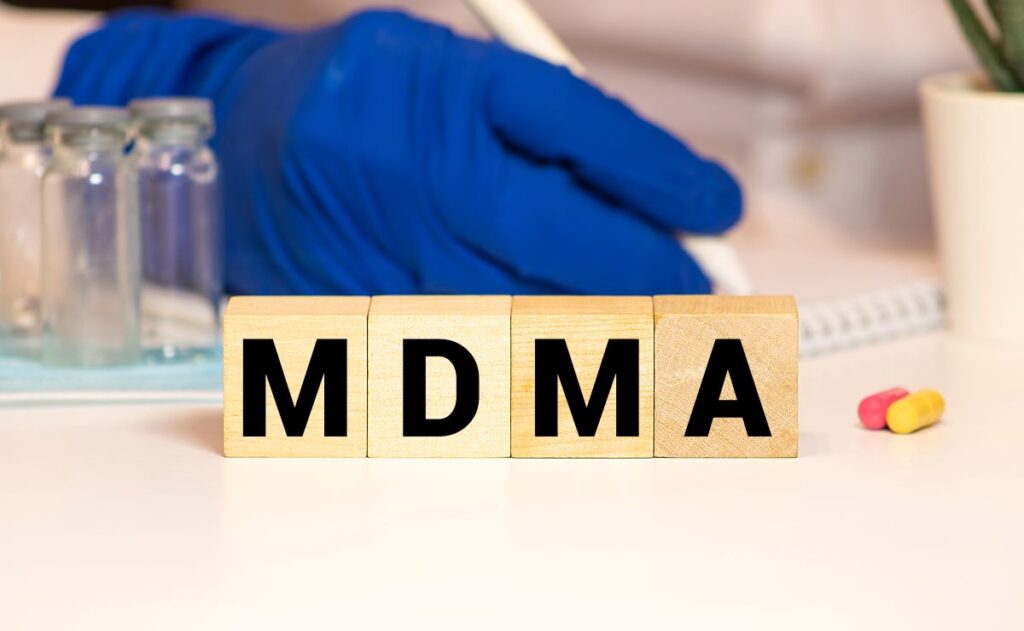How a common street drug can be used to help those with eating disorders
By Gabrielle Finora and the Team at LCWNS
Eating disorders are estimated to impact about 30 million people in the United States. With few successful treatments, researchers and clinicians are interested in the effects of psychedelics. MDMA, more commonly known as molly or ecstasy, has recently been used as a possible therapy for mental health diseases. It was first tested in treatment-resistant Post Traumatic Stress Disorder (PTSD). The synthetic drug has proven to be successful for people who have long struggled with PTSD, with the FDA classifying the low-dose treatment as a “breakthrough therapy”. Now, researchers and clinicians look to this as a treatment option for eating disorders such as anorexia nervosa (AN), bulimia nervosa (BN), and binge-eating disorder (BED).
Eating Disorder Treatment
Eating Disorders (ED) are a group of serious conditions with a lot of unknowns, including their development and how to treat them. Current treatments use behavior-centered strategies, such as cognitive-behavioral therapy and family-based therapy. Sometimes treatment includes medications like antidepressants, appetite-suppressant stimulants (for BED), and antipsychotics. These treatments can be successful for some, however, fewer than half of adults with AN or BN reach full recovery. Can psychedelic treatments improve these statistics?
Recent studies have tested psilocybin (a naturally occurring psychedelic compound in mushrooms), ketamine, and other psychedelics for the treatment of EDs. The results from these studies have been promising, indicating success rates for certain populations. Currently, the only psychedelics approved for clinical use for eating disorders are ketamine and esketamine (a modified version of the drug used as a nasal spray). This may change in the next few years as more research develops.
Incorporating MDMA into ED Treatment
Research suggests that MDMA therapy can be used to treat eating disorders. In a clinical study of 89 individuals with PTSD, MDMA-assisted therapy significantly reduced ED symptoms compared to the therapy and placebo group, among participants with severe PTSD.
Psychedelic-assisted therapy (PAT) is believed to work by dismantling harmful beliefs and thought patterns, including those related to body image. Researchers think that distorted body image might stem from inaccurate high-level beliefs. Psychedelics have the potential to disrupt these higher-level beliefs over time. During a session of MDMA assisted therapy, therapists work to explore and dismantle these higher-level thoughts. Over time, the medication can rework serotonin networks in the brain (critical to sleep, appetite and mood regulation) to help the assisted sessions stick.
Final takeaways:
In conclusion, MDMA-assisted therapy is still a young but promising treatment option for mental health disorders, especially PTSD. New research provides activists with the necessary evidence to inch the government closer to legalizing this treatment. Until then, we can expect to see more talk about implementing MDMA into treatment plans for people struggling with treatment-resistant mental health disorders.
Have questions about psychedelic-assisted therapy? Our skillful dietitians are happy to talk with you about potential treatment options. Make an appointment today!
Interested in participating in psychedelic research as a subject? There are many trials in need of participants. Please see the MAPS Study and this advertisement from the UC San Diego Eating Disorders Center for Treatment and Research.You can also see the UCSD Anorexia Clinical Trials website for more studies.
References
Brewerton, T. D., Wang, J. B., Lafrance, A., Pamplin, C., Mithoefer, M., Yazar-Klosinki, B., Emerson, A., & Doblin, R. (2022). MDMA-assisted therapy significantly reduces eating disorder symptoms in a randomized placebo-controlled trial of adults with severe PTSD. Journal of Psychiatric Research, 149, 128–135. https://doi.org/10.1016/j.jpsychires.2022.03.008
Bunnell, D. (2024, March 8). Eating Disorder Statistics. National Eating Disorders Association. https://www.nationaleatingdisorders.org/statistics/
Calder, A., Mock, S., Friedli, N., Pasi, P., & Hasler, G. (n.d.). Psychedelics in the Treatment of Eating Disorders: Rationale and Potential Mechanisms. ScienceDirect.com | Science, health and medical journals, full text articles and books. https://www.sciencedirect.com/
Carhart-Harris, R. L., & Friston, K. J. (2019). REBUS and the anarchic brain: toward a unified model of the brain action of psychedelics. Pharmacological Reviews, 71(3), 316-344.
Eddy, K. T., Tabri, N., Thomas, J. J., Murray, H. B., Keshaviah, A., Hastings, E., Edkins, K., Krishna, M., Herzog, D. B., Keel, P. K., & Franko, D. L. (2017). Recovery From Anorexia Nervosa and Bulimia Nervosa at 22-Year Follow-Up. The Journal of Clinical Psychiatry, 78(2), 184–189. https://doi-org.proxy.library.cornell.edu/10.4088/JCP.15m10393
Ho, J. T., Preller, K. H., & Lenggenhager, B. (2020). Neuropharmacological modulation of the aberrant bodily self through psychedelics. Neuroscience & Biobehavioral Reviews, 108, 526-541.
Riaz, K., Suneel, S., Hamza Bin Abdul Malik, M., Kashif, T., Ullah, I., Waris, A., Di Nicola, M., Mazza, M., Sani, G., Martinotti, G., & De Berardis, D. (2023). MDMA-Based Psychotherapy in Treatment-Resistant Post-Traumatic Stress Disorder (PTSD): A Brief Narrative Overview of Current Evidence. Diseases (Basel, Switzerland), 11(4), 159. https://doi.org/10.3390/diseases11040159
Singer, D. (2023, November 17). Are psychedelics the future of Eating disorder treatment?. Smithsonian.com. https://www.smithsonianmag.com/science-nature/are-psychedelics-the-future-of-eating-disorder-treatment-180983278/








